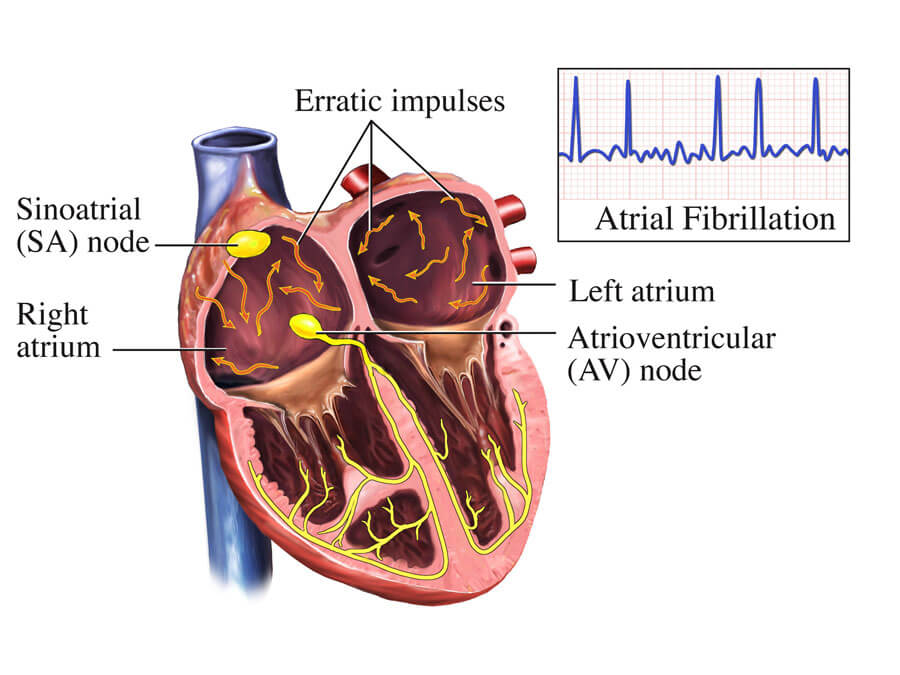A nurse is reinforcing teaching about warfarin with a client who has a new onset of atrial fibrillation. Which of the following statements should the nurse include in the teaching?
"Warfarin dissolves clots in the bloodstream."
"This medication slows the response of the ventricles to the fast atrial impulses."
"Warfarin helps prevent strokes in clients who have atrial fibrillation."
"This medication will help maintain a normal heart rhythm."
The Correct Answer is C
Choice A reason : The statement that warfarin dissolves clots in the bloodstream is incorrect. Warfarin does not dissolve existing clots. Instead, it is an anticoagulant that works by decreasing the production of certain clotting factors in the blood, which helps prevent the formation of new clots.
Choice B reason : This statement is not accurate regarding the action of warfarin. Warfarin does not affect the electrical impulses of the heart. Medications that slow the response of the ventricles to fast atrial impulses are typically antiarrhythmic drugs, not anticoagulants like warfarin.
Choice C reason : This is the correct statement. Warfarin is prescribed for clients with atrial fibrillation to reduce the risk of stroke. Atrial fibrillation increases the risk of forming blood clots in the heart, which can then travel to the brain, causing a stroke. Warfarin's anticoagulant effect helps to prevent these clots from forming.
Choice D reason : Warfarin does not help maintain a normal heart rhythm. It is not an antiarrhythmic drug but an anticoagulant. The purpose of warfarin in atrial fibrillation is to prevent stroke by reducing the risk of clot formation, not to correct the heart rhythm.

Nursing Test Bank
Naxlex Comprehensive Predictor Exams
Related Questions
Correct Answer is D
Explanation
Choice A reason : The triglyceride level of 130 mg/dL is within the normal range, which is less than 150 mg/dL for adults. Therefore, this result does not place the client at risk for peripheral arterial disease.
Choice B reason : An HDL level of 84 mg/dL is considered good as it is higher than the minimum recommended level of 40 mg/dL for males and 50 mg/dL for females. Higher levels of HDL are protective against heart disease.
Choice C reason : A blood glucose level of 92 mg/dL is within the normal fasting range of 70 to 99 mg/dL. This indicates that the client does not have diabetes, which is a risk factor for peripheral arterial disease.
Choice D reason : An LDL level of 172 mg/dL is considered high since the optimal level for LDL is less than 100 mg/dL. High levels of LDL cholesterol can lead to atherosclerosis, increasing the risk for peripheral arterial disease.
Correct Answer is A
Explanation
Choice A reason f:Intermittent claudication is a classic symptom of PAD, characterized by muscle pain or cramping in the legs triggered by exercise, such as walking, which typically disappears after a few minutes of rest. This symptom occurs due to inadequate blood flow to the muscles during increased demand.
Choice B reason :Darkened skin color near the extremities, also known as hyperpigmentation, can occur in PAD due to the chronic ischemia and the resultant buildup of waste products in the tissue, which may lead to skin changes.
Choice C reason :Warm extremities are not typically associated with PAD. In fact, patients with PAD may have cooler extremities compared to the rest of the body due to reduced blood flow.
Choice D reason :Edema is not a common finding in PAD. Instead, PAD can lead to decreased skin temperature, loss of hair, shiny skin, and non-healing wounds on the extremities due to poor circulation.
Whether you are a student looking to ace your exams or a practicing nurse seeking to enhance your expertise , our nursing education contents will empower you with the confidence and competence to make a difference in the lives of patients and become a respected leader in the healthcare field.
Visit Naxlex, invest in your future and unlock endless possibilities with our unparalleled nursing education contents today
Report Wrong Answer on the Current Question
Do you disagree with the answer? If yes, what is your expected answer? Explain.
Kindly be descriptive with the issue you are facing.
